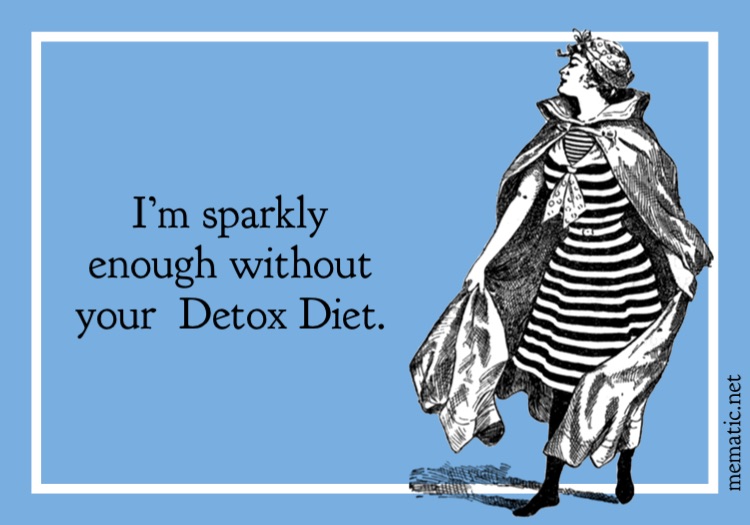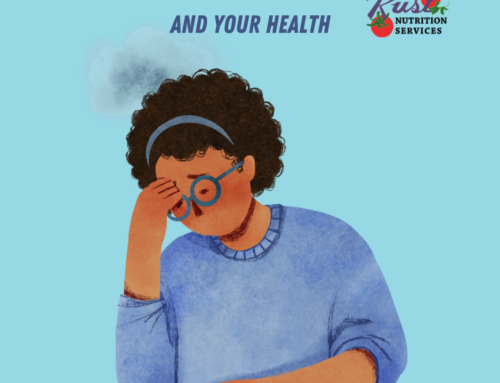Go ahead, accuse me of clickbait, using the “D” word in my title: Detox.
It’s been a thing for several years now, with everything from complete “cleanses” to “detox diets” to the more vague advice to “remove the toxins from your diet”.
Do you realize if you were consuming that many toxins every day you’d be dead? I mean seriously, the word “toxic” literally means “causes death”. There’s a trend to use fear in marketing, so when you begin to see all of the advertisements for “Detox Diets” in January, beware.
You may hear about a “3-day Diet Detox” or a “10-Day Detox Diet”, but what is the real deal? Many times I’ve heard about “sludge” in the colon that needs to be cleaned out (in my mind that’s called colonoscopy prep). One website promised that their detox diet will make your “eyes sparkle and your skin glow”.
While it is true that people have varying genetics, and their environment, diet and lifestyle can impact their body’s ability to detoxify itself, following a “detox diet plan” can be dangerous at worst, and just won’t do anything at best. In healthy people, your liver and colon do the detox by neutralizing and eliminating toxins.

Detox Without the Detox Diet
There are other reasons your typical intake over the holidays disrupts your body: Hydration, excess sugar and alcohol, less vegetables, and lack of sleep.
The holidays are a time of indulgence, so it’s typical for these “detox plans” to pop up in your feed in the new year. What actually does help your body after the holidays, is simply getting back to normal eating and eliminating the extra junk calories from your diet.
When you add more vegetables and fruit, or some fermented foods, to your diet, you gain loads of antioxidants, at a low calorie cost. These antioxidants play a role in keeping cells healthy and this can in fact help keep your skin healthier, plus you’ll generally feel better.
Proper hydration also helps maintain healthy cells. Since alcohol is dehydrating (and it’s likely that when you are burning the candle at both ends) focus on staying well hydrated. Be more mindful of your water intake (bonus – proper hydration supports healthy skin).
When snacking on high sugar foods (hello cookies and candy) replace high fiber fruits and veggies or calcium-rich yogurt with active cultures, this contributes to your diet being off balance. Think ahead. Instead of waiting for January, plan a salad or veggie dish for lunch one day this week, and make the effort to peel an extra orange, or slice an apple after work to snack on.
Finally, lack of sleep does not do a body good. As large as your “to-do” list has grown this month, take a moment to see what you can do without, and carve in time for both exercise and sleep. Exercising daily can help your body get to sleep at night. Do your best to go to bed about the same time each night. Don’t stay up until midnight wrapping presents. Set an “end time” to your day, and move whatever chore is left to the next day. Being more rested will make every subsequent day more productive.
Key Words
Headlines are created to get your attention. Sometimes they promise the impossible (“Lose 10 pounds this week with Our Detox Plan!”). While you may lose ten pounds fasting and detoxing through a week, that’s not a healthy approach and you will be sure to gain it back.
Steer clear of any diet advice in the new year that uses these directives or claims:
- Cleanse your liver, kidneys, or colon
- Strict list of foods or ingredients to avoid (ALL sugars, starches, grains, dairy, etc)
- Long term fasting
- Promises to lose more than 3 pounds in a week.
- Treats adrenal fatigue – this vague medical term when used by non-medical people is often a red flag that the dietary advice is misinformed
- Promises to “cure” (diabetes, depression, etc)
- Costs money – you have to buy something (a juice, supplement, or special powder) for it to work
A Balanced Diet = Balanced Body
You don’t want to go on a detox diet in 2018. You do want to keep working on eating well, exercise, sleeping well, and stress management, all year round. Once the holidays are over, it’s usually a welcome time to eat less, choose healthy food, get back to a more regular exercise routine, and limit or avoid alcohol. Rather than forcing yourself to “go on a detox” for a short period of time, why not just focus on an overall lifestyle improvement?
The DASH Diet and the Mediterranean Diets are both good choices to keep your body healthy, that focus on plant-based foods (fruits, vegetables and grains). A vegetarian diet is great too, but you can also just work in a vegetarian meal once a week, and add more vegetable side dishes.
Enjoy the holiday season, and once it’s over, keep these 5 simple tips in mind:
- After a season of over indulging, January is a good time to cut back on or eliminate alcohol. Replace your daily glass of wine with a cup of herbal tea with lemon or an orange slice after work.
- Add salads, pulses, grains, and more vegetables. Cook extra vegetables and lean meats for dinner so you can eat leftovers for lunch. Create tasty large maid-dish salads with lots of mixed greens, sliced peppers, pickled beets, and add a low fat protein (such as tuna, chicken breast, chick peas, or sliced pork loin). Pulses refers to all types of beans and legumes. Experiment with different legumes and grains such as chickpeas, quinoa, or lentils, and include them in your side dish or main dish recipes.
- Drink more water. Add citrus or cucumber slices to your water bottle for a more refreshing drink. Keep a large water bottle at your desk as a cue to drink more.
- Cut back on sweet treats. You don’t have to obsess over every food label, just skip the obvious high-sugar sources: Soda, juices, bakery goods, candy.
- Schedule exercise at least 3 times a week, and get a good night’s sleep.





[…] changes don’t last either. “Detox diets” are popular this time of year, but they aren’t necessary. Eliminating food groups (“I’m swearing off bread!”) or obsessively avoiding […]